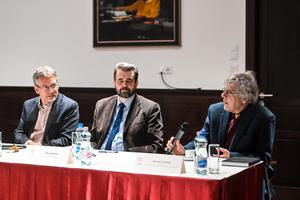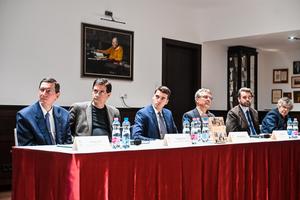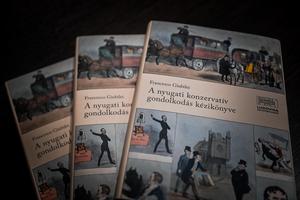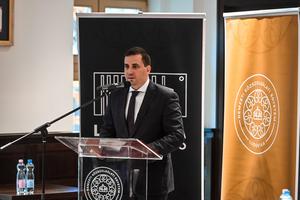The world of conservatism is alive, diverse and much richer than daily political practice suggests, and each country can contribute to its enrichment with its own individual style. This was revealed at the presentation of Francesco Giubilei's new book on November 25 at the University of Public Service (UPS): “The Handbook of Western Conservative Thought”.
Francesco Giubilei is one of today's most popular conservative publicists, an Italian political scientist who was listed by Forbes magazine as one of the 100 most influential Italians under 30. Not for nothing, despite his young age, he is a regular author of leading magazines, a lecturer at the Giustino Fortunato University in Benevento and a regular guest speaker at various Italian and international events.
The event organized by the Political and State Research Institute (PÁK) of the Eötvös József Research Center (EJKK) and the Ludovika University Publishing House was opened by Gergely Deli. The rector of UPS emphasized that the book's major virtue is that it frees conservatism from the grip of narrowly understood political practice and presents it as a living culture that is still attractive today.
The round table discussion about the book curated by the Ludovika University Publishing House was moderated by Ferenc Hörcher, head of the EJKK PÁK, and was held in the John Lukacs Lounge of the Ludovika Side Building. In addition to the author, Tibor Mándi, associate professor of the Institute of Political Science of the Faculty of State and Law of Eötvös Lóránt University, Gergely Egedy, professor of the Department of Government and Public Policy at the Faculty of Political Science and International Studies of UPS, as well as Tamás Nyirkos and Kálmán Tóth, have participated in the exchange of ideas. Researcher at PÁK EJKK.
Francesco Giubilei emphasized that when he wrote the volume, he had in mind to liberate the meaning of the word conservatism from its captivity in his own country, Italy because in the press and also sometimes in academic life, it was confused with classical liberal thinking. In addition, there is still a misunderstanding in public opinion that those who are conservative want to return to the past. He emphasized: "The conservative always lives in the present, of course they are connected to their past, but they look to the future innovatively.” In fact, conservatism is not just an ideology, but a condition, one of the possible natures of man. The volume seeks to present and connect the conservative thinking of different nations. One of the most important goals of the Hungarian edition is the same: it wants to draw the attention of Hungarian thinkers to the rich conservative tradition. The book reveals that there is no single continental conservative idea - every country has developed its own style, in which the unique character of national thinkers creates the appeal of conservatism that is still effective today.
It was said in connection with the origin of conservatism that Plato and Aristotle were certainly not liberals, although the question is: how legitimate is it to apply modern ideologies to ancient authors. However, it is certain that some of the ideas of Cato and Cicero can be compared with the works of later conservative thinkers.
The temptation of totalitarian ideas in conservative thinking arose as an important issue. Giubilei emphasized that it is not right to revive a sad episode of history as a negative sign. “It is especially strange when American authors use it - often pointlessly - for right-wing figures whose country never had fascism.”
In connection with the future possibilities of conservatism, it was said: “today there is a big swing away from the tradition of classical political schools in the USA - fundamental values are being questioned on the altar of progressivism.” This is why classical liberalism and conservatism can perhaps be partners in jointly managing to overcome alarming extremes.
Text: Tibor Sarnyai
Photo: Dénes Szilágyi






